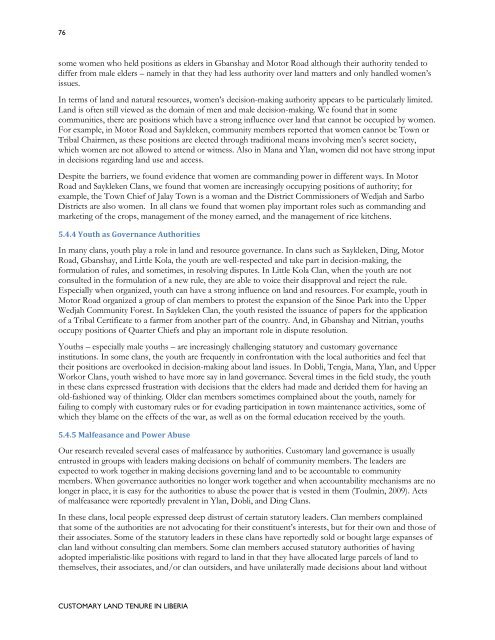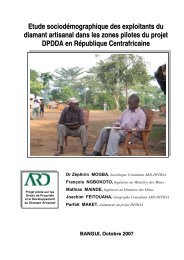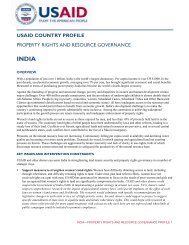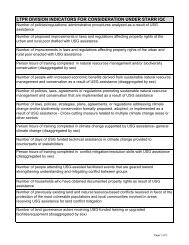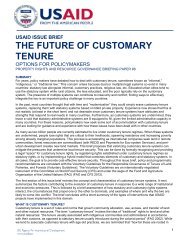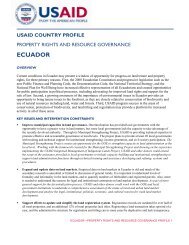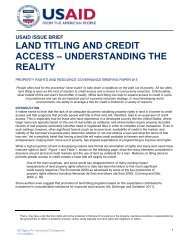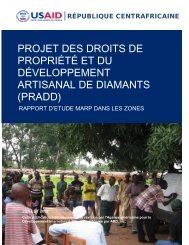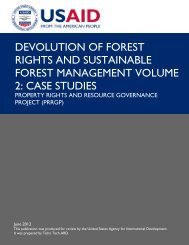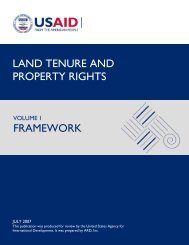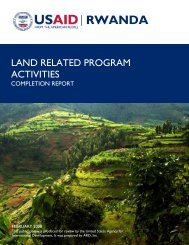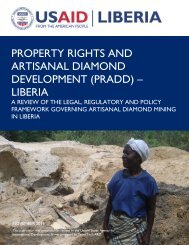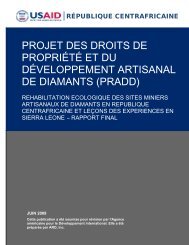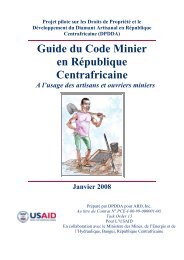Customary Land Tenure in Liberia - Land Tenure and Property ...
Customary Land Tenure in Liberia - Land Tenure and Property ...
Customary Land Tenure in Liberia - Land Tenure and Property ...
Create successful ePaper yourself
Turn your PDF publications into a flip-book with our unique Google optimized e-Paper software.
76<br />
some women who held positions as elders <strong>in</strong> Gbanshay <strong>and</strong> Motor Road although their authority tended to<br />
differ from male elders – namely <strong>in</strong> that they had less authority over l<strong>and</strong> matters <strong>and</strong> only h<strong>and</strong>led women‟s<br />
issues.<br />
In terms of l<strong>and</strong> <strong>and</strong> natural resources, women‟s decision-mak<strong>in</strong>g authority appears to be particularly limited.<br />
<strong>L<strong>and</strong></strong> is often still viewed as the doma<strong>in</strong> of men <strong>and</strong> male decision-mak<strong>in</strong>g. We found that <strong>in</strong> some<br />
communities, there are positions which have a strong <strong>in</strong>fluence over l<strong>and</strong> that cannot be occupied by women.<br />
For example, <strong>in</strong> Motor Road <strong>and</strong> Saykleken, community members reported that women cannot be Town or<br />
Tribal Chairmen, as these positions are elected through traditional means <strong>in</strong>volv<strong>in</strong>g men‟s secret society,<br />
which women are not allowed to attend or witness. Also <strong>in</strong> Mana <strong>and</strong> Ylan, women did not have strong <strong>in</strong>put<br />
<strong>in</strong> decisions regard<strong>in</strong>g l<strong>and</strong> use <strong>and</strong> access.<br />
Despite the barriers, we found evidence that women are comm<strong>and</strong><strong>in</strong>g power <strong>in</strong> different ways. In Motor<br />
Road <strong>and</strong> Saykleken Clans, we found that women are <strong>in</strong>creas<strong>in</strong>gly occupy<strong>in</strong>g positions of authority; for<br />
example, the Town Chief of Jalay Town is a woman <strong>and</strong> the District Commissioners of Wedjah <strong>and</strong> Sarbo<br />
Districts are also women. In all clans we found that women play important roles such as comm<strong>and</strong><strong>in</strong>g <strong>and</strong><br />
market<strong>in</strong>g of the crops, management of the money earned, <strong>and</strong> the management of rice kitchens.<br />
5.4.4 Youth as Governance Authorities<br />
In many clans, youth play a role <strong>in</strong> l<strong>and</strong> <strong>and</strong> resource governance. In clans such as Saykleken, D<strong>in</strong>g, Motor<br />
Road, Gbanshay, <strong>and</strong> Little Kola, the youth are well-respected <strong>and</strong> take part <strong>in</strong> decision-mak<strong>in</strong>g, the<br />
formulation of rules, <strong>and</strong> sometimes, <strong>in</strong> resolv<strong>in</strong>g disputes. In Little Kola Clan, when the youth are not<br />
consulted <strong>in</strong> the formulation of a new rule, they are able to voice their disapproval <strong>and</strong> reject the rule.<br />
Especially when organized, youth can have a strong <strong>in</strong>fluence on l<strong>and</strong> <strong>and</strong> resources. For example, youth <strong>in</strong><br />
Motor Road organized a group of clan members to protest the expansion of the S<strong>in</strong>oe Park <strong>in</strong>to the Upper<br />
Wedjah Community Forest. In Saykleken Clan, the youth resisted the issuance of papers for the application<br />
of a Tribal Certificate to a farmer from another part of the country. And, <strong>in</strong> Gbanshay <strong>and</strong> Nitrian, youths<br />
occupy positions of Quarter Chiefs <strong>and</strong> play an important role <strong>in</strong> dispute resolution.<br />
Youths – especially male youths – are <strong>in</strong>creas<strong>in</strong>gly challeng<strong>in</strong>g statutory <strong>and</strong> customary governance<br />
<strong>in</strong>stitutions. In some clans, the youth are frequently <strong>in</strong> confrontation with the local authorities <strong>and</strong> feel that<br />
their positions are overlooked <strong>in</strong> decision-mak<strong>in</strong>g about l<strong>and</strong> issues. In Dobli, Tengia, Mana, Ylan, <strong>and</strong> Upper<br />
Workor Clans, youth wished to have more say <strong>in</strong> l<strong>and</strong> governance. Several times <strong>in</strong> the field study, the youth<br />
<strong>in</strong> these clans expressed frustration with decisions that the elders had made <strong>and</strong> derided them for hav<strong>in</strong>g an<br />
old-fashioned way of th<strong>in</strong>k<strong>in</strong>g. Older clan members sometimes compla<strong>in</strong>ed about the youth, namely for<br />
fail<strong>in</strong>g to comply with customary rules or for evad<strong>in</strong>g participation <strong>in</strong> town ma<strong>in</strong>tenance activities, some of<br />
which they blame on the effects of the war, as well as on the formal education received by the youth.<br />
5.4.5 Malfeasance <strong>and</strong> Power Abuse<br />
Our research revealed several cases of malfeasance by authorities. <strong>Customary</strong> l<strong>and</strong> governance is usually<br />
entrusted <strong>in</strong> groups with leaders mak<strong>in</strong>g decisions on behalf of community members. The leaders are<br />
expected to work together <strong>in</strong> mak<strong>in</strong>g decisions govern<strong>in</strong>g l<strong>and</strong> <strong>and</strong> to be accountable to community<br />
members. When governance authorities no longer work together <strong>and</strong> when accountability mechanisms are no<br />
longer <strong>in</strong> place, it is easy for the authorities to abuse the power that is vested <strong>in</strong> them (Toulm<strong>in</strong>, 2009). Acts<br />
of malfeasance were reportedly prevalent <strong>in</strong> Ylan, Dobli, <strong>and</strong> D<strong>in</strong>g Clans.<br />
In these clans, local people expressed deep distrust of certa<strong>in</strong> statutory leaders. Clan members compla<strong>in</strong>ed<br />
that some of the authorities are not advocat<strong>in</strong>g for their constituent‟s <strong>in</strong>terests, but for their own <strong>and</strong> those of<br />
their associates. Some of the statutory leaders <strong>in</strong> these clans have reportedly sold or bought large expanses of<br />
clan l<strong>and</strong> without consult<strong>in</strong>g clan members. Some clan members accused statutory authorities of hav<strong>in</strong>g<br />
adopted imperialistic-like positions with regard to l<strong>and</strong> <strong>in</strong> that they have allocated large parcels of l<strong>and</strong> to<br />
themselves, their associates, <strong>and</strong>/or clan outsiders, <strong>and</strong> have unilaterally made decisions about l<strong>and</strong> without<br />
CUSTOMARY LAND TENURE IN LIBERIA


